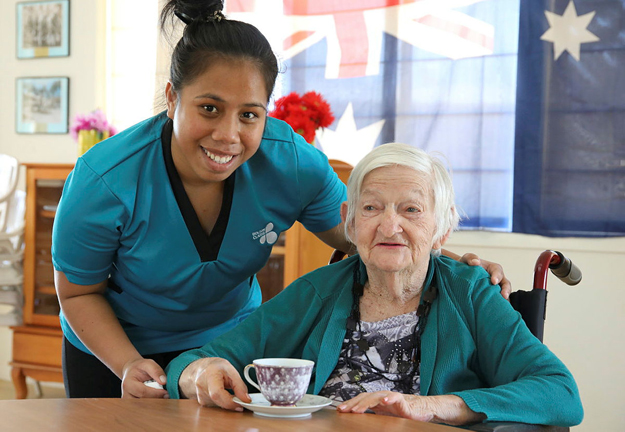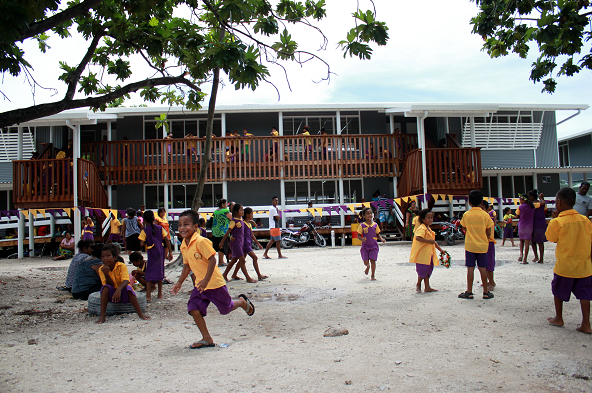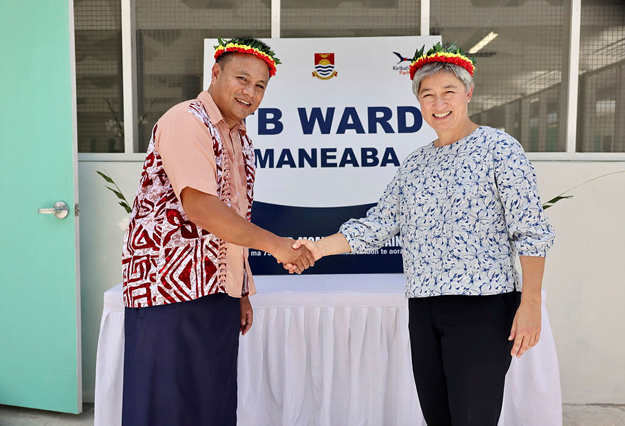Kiribati

Australia and Kiribati enjoy close and longstanding relations based on regional and international cooperation, trade links, a substantial development assistance program, support for maritime surveillance and broader security operation, and people to people contacts. Australia's vision is to support Kiribati in its own efforts to strengthen its democratic institutions and economic and environmental resilience. Australia is supporting the Government of Kiribati's development strategy and KV20.
Labour mobility
Kiribati participates in the Pacific Labour Mobility Scheme, designed to help fill labour shortages in rural and regional Australia and provide employment experience, skills, and income for Kiribati workers. It also participates in the Seasonal Workers Programme.
More about Pacific Labour Mobility
Education
In 2024, Australia established a new program, in partnership with the Government of Kiribati, called EduKAIT – the Kiribati Australia Education Program in Tungaru. Australia has committed $25 million over the first five years of the program.
EduKAiT seeks to strengthen the Government of Kiribati’s capacity to deliver education services and improve gender equality, disability inclusion and climate change. The program will support key objectives in the Kiribati Ministry of Education’s Education Sector Strategic Plan 2024-2027. There is a strong emphasis on improving teaching and learning outcomes across all year levels.
EduKAIT builds on the achievements of Australia’s previous education program, the Kiribati Education Improvement Program (KEIP). Australia invested $98 million (2011-23) into Kiribati’s education system through KEIP.
Under KEIP, Australia supported climate resilient school infrastructure construction and rehabilitation, benefiting more than 63% of I-Kiribati school students. Over 90% of teachers in Kiribati, through KEIP support, received in-service professional development training. Students in years 1 – 9 are now learning from an updated curriculum and are using over 30,000 pieces of quality furniture. Disability was a key focus under KEIP, with 217 students with disability mainstreamed into primary and secondary education.
Related links
- Kiribati Education Improvement Program 2018 Independent evaluation report and management response
- Kiribati Education Improvement Program (KEIP) Infographic 2011-2023
Health
Australia is working with the Government of Kiribati to improve efficiency and access to health services and achieve universal health coverage. This is in line with the Kiribati Ministry of Health and Medical Services Strategic Plan 2024-2027.
Australia’s bilateral support to the health sector is through the Kiribati-Australia Health Sector Program Phase II (KAHSP II), with at least $6 million of support over the next four years. The regional Partnerships for a Healthy Region (PHR) initiative complements our bilateral program.
Through KAHSP II, Australia is working to improve health outcomes in Kiribati by improving control and treatment of communicable diseases; strengthening responses for non-communicable diseases and expanding sexual and reproductive healthcare to make sure people have access to the information and services they need to make their own choices.
KAHSP II is also supporting the development of skills and expertise of the Kiribati health workforce through the provision of targeted training for health workers and officials and capacity building of health laboratories and pathology services.
Australia has provided longstanding support to the health sector in Kiribati. Under the previous phase of support, KAHSP (2018-23), Australia invested $9.6 million to support health systems strengthening and managing high-burden infectious diseases (such as tuberculosis, leprosy and Hepatitis B).
Rapid response to disease outbreaks
The Kiribati-Australia Health Support Program incorporates a flexible direct disbursement mechanism to enable the Government of Kiribati to respond to emerging health priorities and communicable disease threats.
In October 2023, this enabled the Ministry of Health and Medical Services (MHMS) to mobilise a rapid response to a tuberculosis (TB) outbreak on Abemama island. MHMS dispatched 11 personnel to Abemama to test and treat TB cases, and deliver island-wide community awareness, refresher training for heath workers and screening, treatment and prevention reaching a total of 657 people.
MHMS’s timely response contained infections, ultimately preventing the development of multi-drug resistant cases.




